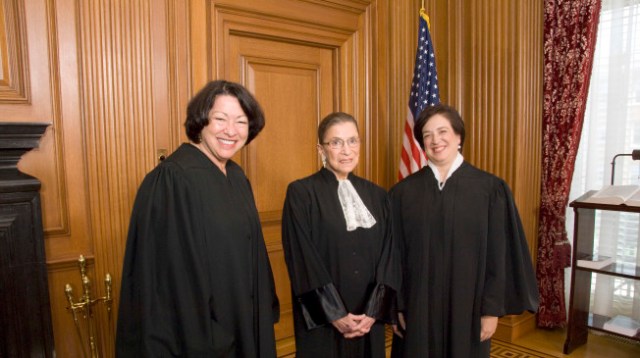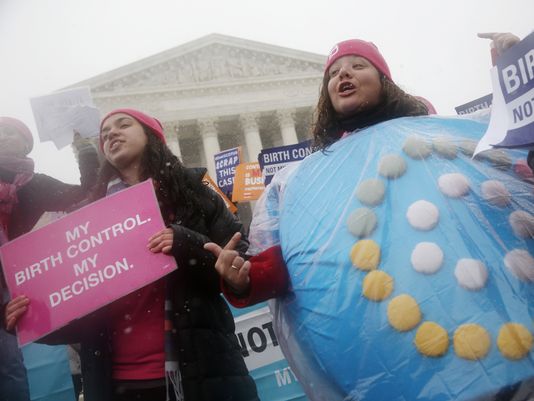Four years after its initial passage, lawmakers and lawyers are still talking about — and making pretty big decisions regarding — the Affordable Care Act. Today was a big day for a case that could dramatically affect interpretation of the contraception requirements of the health care mandate, as well as the right of private companies and corporations to invoke religious beliefs in response to federal law.
The justices heard 90 minutes of oral arguments regarding the cases Sebelius v. Hobby Lobby Stores, Inc. and Conestoga Wood Specialties Corp. v. Sebelius. The two challengers claim that because the companies have religious foundations (the owners are Southern Baptist and Mennonite, respectively), they cannot be required to provide insurance that includes birth control they say causes abortions, specifically IUDs and the morning after pill (though most reports refute those claims). The justices will likely rule on the case in June, and it’s hard to predict the outcome after today’s hearings.
As predicted, it appears that Justice Anthony Kennedy will be a swing vote in the case. Justices Scalia, Alito and Thomas appeared to stand with the challengers, as is expected of those conservative justices. All three women justices spoke strongly on the side of the government. They, like 84 percent of women voters in a recent poll, believe women should be able decide when and how to use birth control, not those women’s bosses.

The New York Times does a good job of breaking down the current state of the ACA and these cases. Pew also has some helpful, more detailed information on the background and context of the case, but I’m most interested in their explanations of the potential affects depending on how the court rules.
If the government prevails and the Supreme Court holds that RFRA does not cover for-profit entities or their owners or managers, the decision would immediately end all religious-liberty-based challenges to the contraception mandate by for-profit businesses. It also would bar businesses from invoking RFRA in lawsuits challenging other laws. Such a ruling would not, however, have any impact on the pending challenges to the contraception mandate by religious nonprofit organizations.
RFRA is the Religious Freedom Restoration Act, which in 1993 “directs courts to exempt any party who can show that the challenged law or government action substantially burdens his or her religious practice, unless the government shows that the law advances a compelling interest that cannot be achieved without imposing the burden on the person’s free exercise of religion.” One of the big questions in this case is whether private, non-religious corporations have that same right not to follow laws or government acts that burden their religious practice, since the RFRA was designed to protect individuals. But this is a post-Citizens United world. If the court rules in favor of the companies, it would open the door for companies to object to following any laws they feel are contrary to their religion — Kagan pointed out child labor laws, sex discrimination laws, and minimum wage laws as potential targets. Another obvious potential target is federal laws that require equal benefits and protections for queer individuals and couples. Plenty of businesses already want to invoke religion to discriminate against gay people, as was made clear in Arizona last month.

Of course, there are all sorts of in between places where the justices could land, some that dramatically expand the scope of religious liberty and others that maintain the status quo. The court could rule, for example, that RFRA does apply to companies but that the birth control provision does not count as a substantial burden because the employer is so far removed from the provision of birth control from insurance company to individual. That would make it hard for the religious non-profits gunning for exemptions to the birth control part of the mandate in other cases to succeed.
The outcome of the case matters greatly not just for women who want to take birth control while working for companies with religious owners, but anyone with a religious employer who wants equal rights and protections under the law. It’s endlessly frustrating to watch corporations and individuals invoke the Constitution and the Gospel to justify discrimination, when both those documents inherently aim to extend freedom and justice to all people. Of course constitutional interpretation is far more complicated than that, but I’m pretty sure the Founding Fathers would be like, “Go home and make a foam picture frame Hobby Lobby, you’re drunk.”








Comments
Requesting Autostraddle article that offers crafty alternatives to Hobby Lobby, which is awful but sooo close to my house and sooo temptingly full of glitter.
You Need Help: Reconciling a Desire for Social Justice and Glitter
Joann Fabrics or Michael’s.
Ah right! I drive by a Hobby Lobby most days so it erases all the craft stores in my head.
Look for a non-big-box craft store and support your local, independent seller. Here in Maine we have Craft Mania. If that’s impossible, go online. Etsy has tons of folk who sell supplies.
Ehh, This is why I dislike Hobby Lobby for their political outlook! Fuck them
Ugh this case is so intense. Keep us posted!
This whole situation just enrages me. Like, if they get away with this bullshit, what’s next? Corporations forbidding their employees from spending their wages on stuff like alcohol or giving to non-Christian religious organizations? Because after all, you wouldn’t have your wages in the first place if it weren’t for the company, so you shouldn’t be able to spend it on things that contradict their “values”?
ARGH!
Agh, it’s true – this is so much bigger than birth control. It’s an everybody issue. Can we organize a sit-in? If used properly, I think googly eyes and glitter could add some gravitas to the cause.
I really don’t understand the US – it was formed on the basis of a separation between church and state, yet laws keep being created to integrate the two.
It’s ridiculous that the personal views of members of an organisation (yes, ‘religious’ institutions are major corporations) are allowed to restrict the freedom and basic rights of others.
(TW it’s ANTHONY Kennedy. Bobby is dead, alas. Otherwise, excellent summary of the issue.
I think I had Justices Roberts and Kennedy in my head at the same time and goofed. Thanks! Corrected.
I used to shop at Hobby Lobby a few times a month for art supplies, but switched to a local store after this whole debacle. Pretty glad people are speaking up en masse, hope it shows that you can’t put religious intolerance in front of basic human decency.
Garbage! Who cares to which store gets my business?
I am an AVID crafter and I go to Hobby Lobby, Michaels, OR JoAnn’s. I have to drive 35 miles And it would be nice to be able to go to ONE store to get it all.
But, so far it has not happened. Usually I can get what I need at Hobby Lobby & Michael’s.
Keep them all; and here is a tip to increase sales . .
Place a few chairs/bench and TV, by front door for Hubby to park while the Mrs. shops . . .
My husband groans when I mention going to craft stores. I have asked MANY husbands and they all say they don’t mind their wives going to stores – IF there was a place to sit with a TV.
SO……HOP TO IT!
… I just, what the fuck? As someone who grew up in the US but is now very far away, I’m glad I have autostraddle to keep me up to date on these things. I just, can’t fathom something like this happening over here, you know?
Great summary, really.
I’m re-watching “Queer as Folk” and it is making me truly appreciate how far we’ve come in the last 10 years and how far we still have to go.
“It’s endlessly frustrating to watch corporations and individuals invoke the Constitution and the Gospel to justify discrimination, when both those documents inherently aim to extend freedom and justice to all people.” I think this perfectly sums it up.
Good article. I strongly disagree, however, that the Founding Fathers would think Hobby Lobby is drunk. Birth control isn’t something that mostly affects white land-owning cis hetero (or at least closeted) dudes. Let’s stop with the fantasy that our country’s founders were awesome, when they were mostly just racist assholes.
Amazing. That is very nice article. I will share this article with my all friends.
https://petshealth.ae/